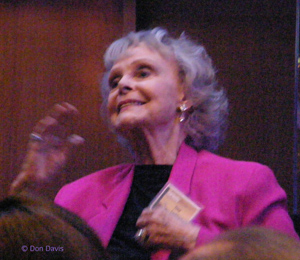

I went in to take a seat inside Von Karman Auditorium. Steadily the auditorium filled up, rows of cameras on the elevated platform at the rear overlooking the rows of chairs divided by a central clear aisle, all facing the elevated stage with its podium and the wide sitting table. At the front of this table were paper slide in name plates which were changed and changed back in some cases as updates on who would be there came in. People filtered in from outside steadily, but the noise level stayed low. There was a steadily building air of quiet concentration and tense waiting. Preliminary events not carried on NASA TV then began. People gave talks with the common theme of inspiration and education, each giving a personal vision and describing some of their NASA and space related experiences.
Astronaut Leland Melvin spoke, introducing Will I Am of the Black Eyed Peas who talked of his musical beginnings and his realization of the importance of science, the STEM areas of learning to young people and society. He proposed an additional priority, the Arts, making the acronym STEAM. He concluded with the imbalance between money going into the prison industry needing attention, with currently far too much emphasis on the latter.
Nichelle
Nichols then took the chair, telling us of her experiences in
encouraging NASA to select astronaut candidates who were other
than white males. She made a crusade of encouraging women and
minorities to aspire to be astronauts, facing early hopeful responses
as well as open mistrust of the government. She took names and
informed NASA that if every qualified minority or woman just happened
to always wash out they would face a public discussion of the
issue. She radiated an air of serene authority and periodically
flashed that wide radiant smile.

Off to the right of the stage other celebrities
appeared in sequence before social media people. June Lockhart
spoke of science fiction TV helping to encourage innovation to
make some of these dreams come true, mentioned an example from
Lost In Space of tiny wearable phone sets.
Wil Wheaton, sporting a beard, talked of the growing importance
of social media in public perceptions. Others came, had their
say, and went.
The live feed from the control room came on and the preliminaries melted away, all attention drawn forward. Odyssey was giving a good data relay, a running commentary announced each milestone as entry approached. The cruise stage let go of the Rover landing package on cue, everything working as needed. A live simulation of the view near Curiosity on the way down showed in the background Mars bigger than the frame with the landing site marked first at the very edge then creeping down from the curved flattening horizon.
The tension hung like a mist in the air, every word of the entry progress hung upon like a living being's life was at stake. A part of all of us was up there with this scary descent playing out, or more properly whose information some 14 minutes delayed by the speed of light was reaching us, in an extended Moment Of Truth. I imagined the Violin climax of 'The Lark Ascending' by Vaughn Williams at that dramatic moment. One person in the control room, Jonathan Grinblat, energetically reacted as he saw indications the sky crane was taking off after doing it's job. A couple clipped reassuring status reports followed, then the pronouncement "Touchdown confirmed!"
The quiet tension broke with a loud cheering, claps, whoops, with "We're sitting on Mars". heard amid the sustained celebratons, as was "Now we'll see where Curiosity will take us". Then congratulations were exchanged everywhere, relief and enthusiastic anticipation in the air. Many Big Players and dignitaries appeared on stage, those from the control room shared the preliminary indications of unqualified success.